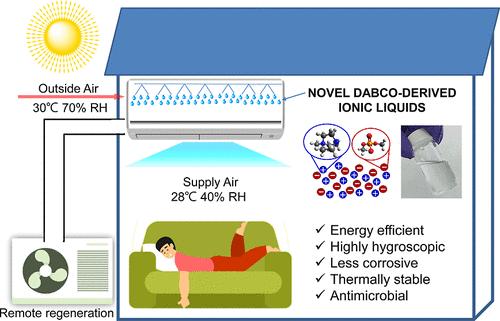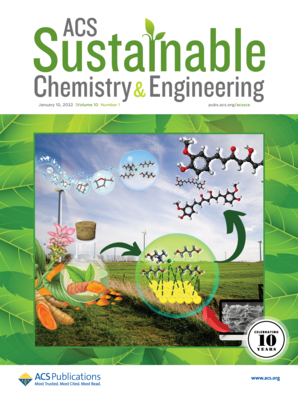用于液体干燥剂空调的新型 DABCO 衍生离子液体
IF 7.1
1区 化学
Q1 CHEMISTRY, MULTIDISCIPLINARY
引用次数: 0
摘要
传统空调从富含水分的空气中抽取水分的效率很低,尤其是在炎热潮湿的地区,因为这会导致更高的能耗。液体干燥剂空调(LDAC)系统是一种很有前途的替代方案,因为它能有效控制温度和湿度,具有节能潜力。离子液体(ILs)被认为是传统卤化盐的干燥剂替代品,具有更好的性能且不会腐蚀金属。本研究介绍了以 1,4-二氮杂双环[2.2.2]辛烷 (DABCO) 为阳离子、以三烷基磷酸酯为阴离子的新型离子液体的合成和结构表征。通过电化学测试研究了铜和铝在这些离子液体溶液中的腐蚀行为。最终得到的离子液体具有很强的吸湿性和抗菌性,同时腐蚀性更低,没有结晶风险。这些优点使 DABCO 衍生的离子液体成为下一代潜在的液体干燥剂。本文章由计算机程序翻译,如有差异,请以英文原文为准。

Novel DABCO-Derived Ionic Liquids for Liquid Desiccant Air Conditioning
Conventional air conditioners are inefficient, especially in hot and humid areas, to take water away from the moisture-rich air since this causes higher energy consumption. Liquid desiccant air-conditioning (LDAC) systems represent a promising alternative due to their effective temperature- and humidity-independent control with energy-saving potential. Ionic liquids (ILs) are considered desiccant substitutes for traditional halide salts with better performance and no metal corrosion. This study introduced the synthesis and structure characterization of novel ILs with cations based on 1,4-diazabicyclo[2.2.2]octane (DABCO) and anions derived from trialkylphosphate. The corrosion behavior of copper and aluminum in these IL solutions was studied with an electrochemical test. The resulting ionic liquids were strongly hygroscopic and antimicrobial while showing much lower corrosivity with no risk of crystallization. These advantages made DABCO-derived ILs the potential liquid desiccants of the next generation.
求助全文
通过发布文献求助,成功后即可免费获取论文全文。
去求助
来源期刊

ACS Sustainable Chemistry & Engineering
CHEMISTRY, MULTIDISCIPLINARY-ENGINEERING, CHEMICAL
CiteScore
13.80
自引率
4.80%
发文量
1470
审稿时长
1.7 months
期刊介绍:
ACS Sustainable Chemistry & Engineering is a prestigious weekly peer-reviewed scientific journal published by the American Chemical Society. Dedicated to advancing the principles of green chemistry and green engineering, it covers a wide array of research topics including green chemistry, green engineering, biomass, alternative energy, and life cycle assessment.
The journal welcomes submissions in various formats, including Letters, Articles, Features, and Perspectives (Reviews), that address the challenges of sustainability in the chemical enterprise and contribute to the advancement of sustainable practices. Join us in shaping the future of sustainable chemistry and engineering.
 求助内容:
求助内容: 应助结果提醒方式:
应助结果提醒方式:


